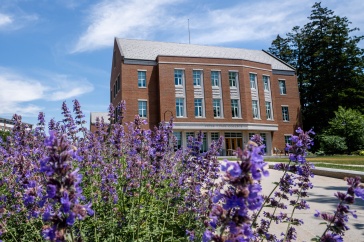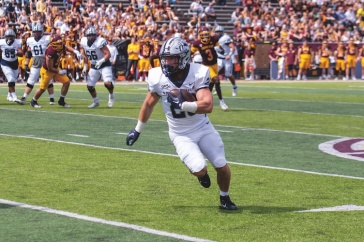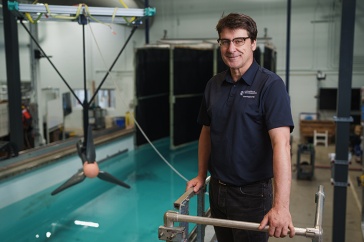The Great Fire
Saving thousands from an inferno
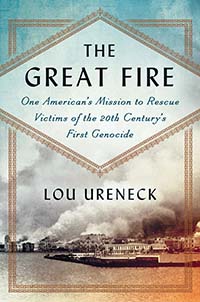 Thirty-five years ago, Lou Ureneck ’72 heard about a forgotten American hero of the historic 1922 fire that destroyed Smyrna, Turkey. Asa Jennings was a Methodist pastor working for the YMCA in Smyrna (now Izmir) when the inferno threatened vast numbers of frantic Greek and Armenian refugees who had surged into the port city in an attempt to avoid slaughter by Mustapha Kemal’s advancing army as it pursued its leader’s aim of a Turkey for the Turks. Thousands of victims of that military onslaught, trapped between a wall of flames and the sea, owed their survival to a dramatic nautical evacuation that Jennings helped to organize. The memory of that story ultimately became The Great Fire (Ecco/HarperCollins, 2015), which sets the devastation of Smyrna in the context of issues that remain flash points in the 21st century. It also tells a story of unusual cooperation among the clergy, relief workers and the military, especially U.S. Naval officers on nearby ships who risked their careers to help with the civilian rescue effort after President Harding declined to send troops to Smyrna. In one such case of teamwork, after Jennings bribed the captain of a passing Italian steamer to take on 2,000 people stranded by the fire, Lt. Cmdr. Halsey Powell of the USS Edsall provided boats to ferry them to it. So many people perished needlessly in Smyrna that it would have been easy for Ureneck to condemn the governments and individuals who did nothing to save them. But for all of its tragedy, this is an uplifting book, written with great narrative flair. With its large cast and historical sweep, The Great Fire remains at heart the story of a man faithful to the Methodist pledge that in his case became a titanic understatement: “I am but one, but I am one. / I cannot do much, but I can do something.”
Thirty-five years ago, Lou Ureneck ’72 heard about a forgotten American hero of the historic 1922 fire that destroyed Smyrna, Turkey. Asa Jennings was a Methodist pastor working for the YMCA in Smyrna (now Izmir) when the inferno threatened vast numbers of frantic Greek and Armenian refugees who had surged into the port city in an attempt to avoid slaughter by Mustapha Kemal’s advancing army as it pursued its leader’s aim of a Turkey for the Turks. Thousands of victims of that military onslaught, trapped between a wall of flames and the sea, owed their survival to a dramatic nautical evacuation that Jennings helped to organize. The memory of that story ultimately became The Great Fire (Ecco/HarperCollins, 2015), which sets the devastation of Smyrna in the context of issues that remain flash points in the 21st century. It also tells a story of unusual cooperation among the clergy, relief workers and the military, especially U.S. Naval officers on nearby ships who risked their careers to help with the civilian rescue effort after President Harding declined to send troops to Smyrna. In one such case of teamwork, after Jennings bribed the captain of a passing Italian steamer to take on 2,000 people stranded by the fire, Lt. Cmdr. Halsey Powell of the USS Edsall provided boats to ferry them to it. So many people perished needlessly in Smyrna that it would have been easy for Ureneck to condemn the governments and individuals who did nothing to save them. But for all of its tragedy, this is an uplifting book, written with great narrative flair. With its large cast and historical sweep, The Great Fire remains at heart the story of a man faithful to the Methodist pledge that in his case became a titanic understatement: “I am but one, but I am one. / I cannot do much, but I can do something.”
Cheating for the Chicken Man
A loving sister tries to help her bullied brother
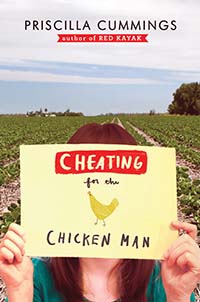 Bullying is a sad business on playgrounds but a thriving one in the publishing industry. An avalanche of books on the subject has expanded in recent years to include thousands of titles for all ages, from picture books for preschoolers to manuals for adults on how to prevent workplace bullying . But the award-winning author Priscilla Cummings ’73 makes the issue her own by investing it with unusual moral complexity in Cheating for the Chicken Man (Dutton, 2015), a novel for ages 10 and up. Children’s books on bullying typically show the mistreatment from the viewpoint of a young victim. Cummings focuses instead on a target’s 13-year-old sister, who faces a painful dilemma as she tries to help an older brother who is cruelly teased when he returns to their family’s Maryland chicken farm after spending months in a juvenile detention center for a prank that went tragically awry. Kate Tyler has just started high school when the suspected bully offers her a Faustian bargain: The tormenting of her brother will end if she will write school papers for the apparent perpetrator. Is it OK to cheat to protect a beloved sibling? Kate’s moral questions deepen when she takes on more duties on the farm, which raises chicks for a chicken company. When ruthless company agents threaten to put her family out of business for trivial reasons, she realizes that corporations can be bullies, too. Cheating for the Chicken Man is the third novel in Cummings’ series that began with Red Kayak, an American Library Association Best Book of the Year, but it works equally well as a stand-alone book. And it’s especially likely to interest adolescents who are ready to explore a more sophisticated theme than more basic books on its subject develop — that bullying, far from being limited to the schoolyard, can exist in any sphere of life.
Bullying is a sad business on playgrounds but a thriving one in the publishing industry. An avalanche of books on the subject has expanded in recent years to include thousands of titles for all ages, from picture books for preschoolers to manuals for adults on how to prevent workplace bullying . But the award-winning author Priscilla Cummings ’73 makes the issue her own by investing it with unusual moral complexity in Cheating for the Chicken Man (Dutton, 2015), a novel for ages 10 and up. Children’s books on bullying typically show the mistreatment from the viewpoint of a young victim. Cummings focuses instead on a target’s 13-year-old sister, who faces a painful dilemma as she tries to help an older brother who is cruelly teased when he returns to their family’s Maryland chicken farm after spending months in a juvenile detention center for a prank that went tragically awry. Kate Tyler has just started high school when the suspected bully offers her a Faustian bargain: The tormenting of her brother will end if she will write school papers for the apparent perpetrator. Is it OK to cheat to protect a beloved sibling? Kate’s moral questions deepen when she takes on more duties on the farm, which raises chicks for a chicken company. When ruthless company agents threaten to put her family out of business for trivial reasons, she realizes that corporations can be bullies, too. Cheating for the Chicken Man is the third novel in Cummings’ series that began with Red Kayak, an American Library Association Best Book of the Year, but it works equally well as a stand-alone book. And it’s especially likely to interest adolescents who are ready to explore a more sophisticated theme than more basic books on its subject develop — that bullying, far from being limited to the schoolyard, can exist in any sphere of life.
Of Note
The Nats and the Grays: How Baseball in the Nation’s Capital Survived World War II and Changed the Game Forever
by David Hubler ’65G and Joshua Drazen, Rowman & Littlefield
A compelling examination of the impact of the war on Washington, DC’s two baseball teams as well as on major league baseball as a whole.
Explore the Cosmos like Neil DeGrasse Tyson
by CAP (Carol) Saucier ’76, Prometheus Books
From the Big Bang to the formation of planets, Saucier’s book weaves together the story of modern astronomy with the account of how a young African-American inner-city kid grew up to be one of the most recognized and influential personalities in all of science.
If You Love Me, Take Me Now
by Steve Cox ’75, ’78G, CreateSpace Independent Publishing
The true story of a family’s struggle with an extremely rare form of brain cancer originating in the nervous system.
Originally published in UNH Magazine—Spring/Summer 2015 Issue
-
Written By:
Janice Harayda '70 | Communications and Public Affairs














































